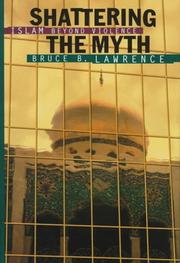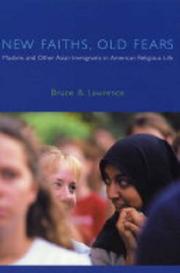| Listing 1 - 10 of 37 | << page >> |
Sort by
|
Book
ISBN: 9004075674 9789004075672 9789004474000 9004474005 Year: 1984 Volume: 40 Publisher: Leiden: Brill,
Abstract | Keywords | Export | Availability | Bookmark
 Loading...
Loading...Choose an application
- Reference Manager
- EndNote
- RefWorks (Direct export to RefWorks)
Ibn Khaldūn, Abū Zayd 'Abd al-Rahmān ibn Muḥammad, --- #SBIB:316.331H421 --- #SBIB:39A10 --- #SBIB:321H91 --- Islam --- -Mohammedanism --- Muhammadanism --- Muslimism --- Mussulmanism --- Religions --- Muslims --- Morfologie van de godsdiensten: Islam --- Antropologie: religie, riten, magie, hekserij --- Niet-specifieke politieke en sociale theorieën vanaf de 19e eeuw: islam, Arabisch nationalisme --- History --- Ibn Khaldun --- Jamāl ʻAbd al-Malik --- Ibn Khaldūn --- عبد الملك، جمال --- عبد الملك، حمال --- Middle East --- History. --- ʻAbd al-Malik, Jamāl. --- جمال عبد الملك --- ابن خلدون --- -Morfologie van de godsdiensten: Islam --- Ibn Khaldun, --- Ibn Chaldun, --- Aben Jaldún, --- Ibn Jaldūn, --- ʻAbd al-Raḥmān ibn Muḥammad, --- Ibn H̤aldūn, --- Khaldūn, Ibn, --- Ibn Khaldoun, --- Ibn Khaldūn, ʻAbd al-Raḥmān, --- Ibnu Khaldun, --- İbni Haldun, --- ʻAbdurrahman Abu Zaid Waliuddin Ibn Khaldun, --- Ibane Khaladuna, --- Ibn Kaldoun, --- עבד אל־רחמאן אבן־ח׳לדון, --- إبن خلدون، عبد الرحمن بن محمد --- ابت خلدون --- ابن خلدون، --- ابن خلدون٠ --- بن خلدون، --- Ibn Khaldūn, --- Ibn Khaldūn, - 1332-1406 --- Mohammedanism

ISBN: 0691057699 9780691057699 0691004870 0691188297 Year: 1998 Volume: *3 Publisher: Princeton, N.J.: Princeton university press,
Abstract | Keywords | Export | Availability | Bookmark
 Loading...
Loading...Choose an application
- Reference Manager
- EndNote
- RefWorks (Direct export to RefWorks)
Islam --- Violence --- Religious aspects --- Islam. --- 20th century --- Islam - 20th century --- Violence - Religious aspects - Islam
Book
ISBN: 9781474401784 9781474401791 9781474401807 9781474401777 1474401783 1474401775 1474401805 1474401791 9781474401808 9781469623276 1469623277 Year: 2015 Publisher: Edinburgh
Abstract | Keywords | Export | Availability | Bookmark
 Loading...
Loading...Choose an application
- Reference Manager
- EndNote
- RefWorks (Direct export to RefWorks)
Allah is the most common and contested name in the Islamic tradition ? but who is he? Engaging with the age old question of who is the God of Islam, Bruce B. Lawrence stakes out the historical nuance of Allah throughout the past 1500 years, from the earliest mention of his name to his appropriation by cyberspace. It introduces a broad range of perspectives, practices and problems linked to Allah, including debates that are intra-religious as well as inter-religious, concerning differences among Muslims as well as between Muslims and non-Muslim others. Chapters cover the range of Muslim perspectives on Allah and tackle such topics as war in the name of Allah and controversies about the use of the name Allah/ God. Throughout the author highlights the need to look at Islam with fresh eyes and to understand Allah/ God with dispassionate insight
297.12 --- Islam: theologie; doctrine --- 297.12 Islam: theologie; doctrine --- God (Islam) --- Dieu (Islam) --- Allah --- Monotheism (Islam) --- Islam

ISBN: 0231115210 0231505477 9780231505475 0231115202 9780231115209 9780231115216 9780231115216 Year: 2002 Publisher: New York Columbia University Press
Abstract | Keywords | Export | Availability | Bookmark
 Loading...
Loading...Choose an application
- Reference Manager
- EndNote
- RefWorks (Direct export to RefWorks)
As a result of immigration from Asia in the wake of the passage of the 1965 Hart-Celler Immigration Act, the fastest-growing religions in America-faster than all Christian groups combined-are Islam, Hinduism, Buddhism, and Sikhism. In this remarkable book, a leading scholar of religion asks how these new faiths have changed or have been changed by the pluralist face of American civil society. How have these new religious minorities been affected by the deep-rooted American ambivalence toward foreign traditions? Bruce Lawrence casts a comparativist eye on the American religious scene and explores the ways in which various groups of Asian immigrants have, and sometimes have not, been integrated into the American polity. In the process, he offers several important correctives. Too often, Lawrence argues, profiles of Asian American experience focus exclusively on immigrants from East Asia, to the exclusion of South Asian and West Asian voices.New Faiths, Old Fears seeks to make all Asians equally important and to break free of traditional geographic markers, most reflecting nineteenth-century imperial values, that artificially divide the people of the "Middle East" from the rest of Asia, with whom they share certain religious and cultural ties. Iranian Americans, in particular, emerge as a vital bridge group whose experience tells us much about how Asians of many different backgrounds have found their way in their new nation.Beyond simply expanding and refining our conception of who Asian Americans are, Lawrence draws instructive comparisons between Asian Americans' experience and those of Native, African, and Hispanic Americans, exposing undercurrents of racial and class antagonisms. He concludes that we cannot fully comprehend the contours and valences of culture and religion in America without understanding how this racialized class prejudice shapes the views of the dominant class toward immigrants and other marginal groups.
Asians --- Immigrants --- Emigrants --- Foreign-born population --- Foreign population --- Foreigners --- Migrants --- Persons --- Aliens --- Orientals --- Ethnology --- Religion. --- Religious life --- History --- United States --- Religion --- Muslims --- Asian immigrants --- American religious life --- Islam --- Hinduism --- Buddhism --- Sikhism --- American civil society --- prejudice --- stereotyping --- American politics
Book
ISBN: 1850432880 Year: 1990 Publisher: London : Tauris,
Abstract | Keywords | Export | Availability | Bookmark
 Loading...
Loading...Choose an application
- Reference Manager
- EndNote
- RefWorks (Direct export to RefWorks)
Book
ISBN: 1469620030 1469620049 1469623277 1469654679 9798890845009 Year: 2015 Publisher: University of North Carolina Press
Abstract | Keywords | Export | Availability | Bookmark
 Loading...
Loading...Choose an application
- Reference Manager
- EndNote
- RefWorks (Direct export to RefWorks)
Book
Year: 1995 Publisher: S.l. Arizona state university. Departement of religious studies
Abstract | Keywords | Export | Availability | Bookmark
 Loading...
Loading...Choose an application
- Reference Manager
- EndNote
- RefWorks (Direct export to RefWorks)
Book
Publisher: Patna Khuda Bakhsh Oriental public library
Abstract | Keywords | Export | Availability | Bookmark
 Loading...
Loading...Choose an application
- Reference Manager
- EndNote
- RefWorks (Direct export to RefWorks)
Book
Year: 1978 Publisher: Téhéran Imperial Iranian academy of philosophy
Abstract | Keywords | Export | Availability | Bookmark
 Loading...
Loading...Choose an application
- Reference Manager
- EndNote
- RefWorks (Direct export to RefWorks)
Book
Year: 1978 Publisher: Tehran Imperial Iranian Academy of philosophy
Abstract | Keywords | Export | Availability | Bookmark
 Loading...
Loading...Choose an application
- Reference Manager
- EndNote
- RefWorks (Direct export to RefWorks)
| Listing 1 - 10 of 37 | << page >> |
Sort by
|

 Search
Search Feedback
Feedback About UniCat
About UniCat  Help
Help News
News